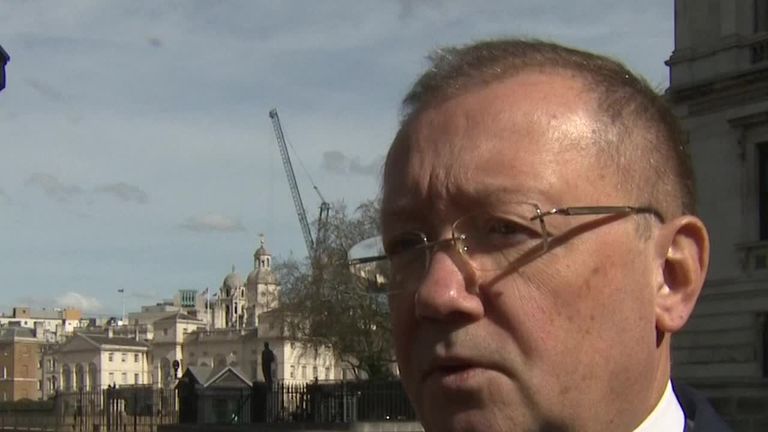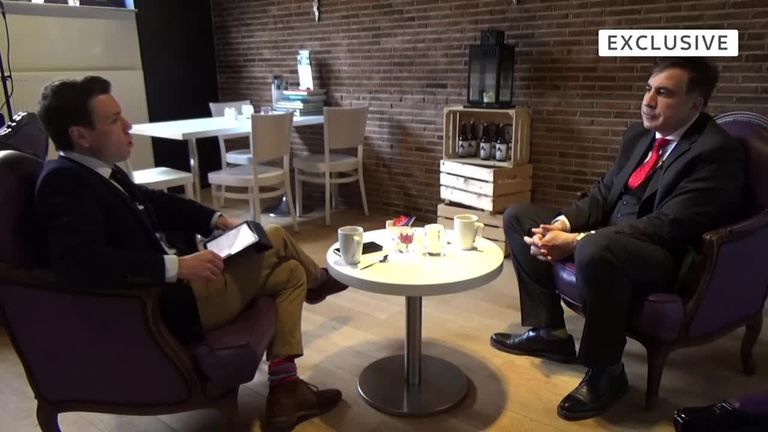A poisoned spy - the story so far

Friday 23 March 2018 16:59, UK
It started with a man and woman found unconscious on a bench in a quiet city.
Two weeks on, the poisoning of former spy Sergei Skripal and his daughter Yulia has revived a world of espionage and high-stakes diplomacy that would not have been out of place in the Cold War.
Britain has expelled 23 Russian diplomats, suspended bilateral relations and toughened sanctions against Russia, and officials will not attend the World Cup in the country this year.
Theresa has insisted the government would "never tolerate the threat to life to British people" and said it is "tragic" that "President Putin has chosen to act in this way," while foreign secretary Boris Johnson has upped the fighting talk.
Russia has matched the fighting talk, expelling 23 British diplomats in retaliation, branding Mr Johnson's comments "unforgivable" and turfing the British Council from within its borders.
:: 'Drivel, rubbish, nonsense': Putin denies poisoning claims
Russian ambassador Alexander Yakovenko has accused Britain of violating international law, condemned talk of cyberattacks and promised expulsions, saying: "Always in diplomacy there is reciprocity."
So how did we get to this point?
What happened?
The current crisis unfolded in the seemingly unremarkable setting of Salisbury, a cathedral city in Wiltshire.
At 2.30pm on Sunday 4 March, Sergei and Yulia Skripal were seen at a Zizzi's restaurant in Castle street in the city centre.
Less than two hours later they were found slumped on a bench in a nearby shopping centre - the victims of a sophisticated chemical attack that appears to be linked to international espionage at state level.
With the pair in a critical condition in hospital, the investigation into the attack has taken many twists and turns.
Experts in protective hazmat suits have descended on different areas throughout Salisbury - from the graveyard where Mr Skripal's wife and son are memorialised to a nearby business park.
Formerly incongruous details have been analysed in an attempt to unpick what happened.
Yulia arrived at Heathrow from Russia the day before she and her father were taken to hospital. Was she unwittingly carrying a poison?
Amid repeated Cobra and National Security Council meetings, attention turned to the former spy's home and fears grew over the possibility of contamination - heightened further when it emerged a police officer who had visited his house had been taken ill.
National attention fell on a history of Cold War espionage - and speculation over why Mr Skripal and his daughter were targeted.
Who is Sergei Skripal?
The 66-year-old former double agent at the centre of this crisis appeared to have been leading a quiet life in Salisbury after being freed in a prisoner swap with Russia in 2010.
He was sentenced to 13 years in a Russian jail for spying for the British government, having confessed to being recruited in 1995 for a fee of about $100,000.
Igor Sutyagin - another spy freed in the prisoner swap - said he had talked about his family during their encounters, saying it seemed "it was his family which was his major joy".
Why Mr Skripal was targeted, however, is unclear.
There has been some speculation that he was still working as a spy, inspiring the wrath of Russian authorities.
But some have suggested that Russia leader Vladimir Putin could be being framed. Espionage historian Alexander Vissiliev told Sky News that while it doesn't make sense for Mr Putin to have someone killed, it "means a lot to adversaries".
This is the repeated refrain of Russia, who have redirected suspicion toward Britain, shedding doubt on Twitter and in statements over a perceived lack of transparency in the investigation,
What is the poison?
Mr Skripal is believed to have been poisoned by Novichok - a deadly nerve agent said to have been developed in secret Russian laboratories of the Cold War, and named after the word for newcomer.
Nerve agents block acetylcholinesterase, an enzyme which is active in the the nervous system, resulting in muscles contracting and cardiac arrest and asphyxiation.
The agent is both "highly illegal" and "extremely powerful" according to specialist Andy Oppenheimer. But because it is a binary weapon - made from two non-toxic precursor chemicals - it can be transported fairly easily.
How the chemical was administered - via a spray, in food, or even in a suitcase unwittingly carried by Yulia, who was visiting from Russia - is unclear.
While it is being investigated, Public Health England has sought to reassure the people of Salisbury that the risk to the general public is low.
However, the inventor of the chemical told Sky News it poses a danger to the public.
"It's very bad because even a very small dose... is still very effective and the consequences could be in years probably," Dr Vil Mirzayanov said.
He described the use of the chemical as a "fingerprint" - one that powerfully indicates Russian involvement.
What does this mean for global security?
What the poisoning is going to mean for the relationship between Britain and Russia is unclear. But it is already looking serious.
Mikheil Saakashvili, the former president of Georgia and one of Mr Putin's longstanding opponents, has said the West should fear him.
"The guy has been evolving and evolving in a worse direction and he has been moving his red lines all the time," he told Sky News.
"He thinks that he can manipulate everyone, he thinks that the world is a very cynical place; everybody is for sale and he has this advantage, he is eternal, he is always in power."
In his interview with Sky News, Ambassador Alexander Yakovenko accused Britain of violating international law by not following the correct procedure for officially identifying chemical weapons.
Meanwhile, fears are growing among people caught on either side of the rift.
Exiled Russian businessman Sergey Kapchuk told Sky News that he is so worried about his safety he has hired bodyguards for protection.
The poisoning is also creating tensions in the UK.
Attention has fallen on Jeremy Corbyn after the Labour leader urged against cracking down on Russia or attempting to "resign ourselves to a 'new Cold War' of escalating arms spending, proxy conflicts across the globe and a McCarthyite intolerance of dissent".
It led some backbench MPs to heckle Mr Corbyn for failing to explicitly back Theresa May's assertion of Russian responsibility for the attack.
![鈥疨ic: CPS
Images of two defendants in fake ID seized from Bulgarian gang found guilty of spying for Russia in a huge espionage operation from a guesthouse in Great Yarmouth. Left is Katrin Ivanova, [DOB: 01/07/1991], is of Harrow, north-west London. Right is Tihomir Ivanchev, [DOB: 31/07/1985], is of Acton, west London](https://e3.365dm.com/25/03/192x108/AG百家乐在线官网news-katrin-ivanova-tihomir-ivanchev_6849259.png?20250307175120)








